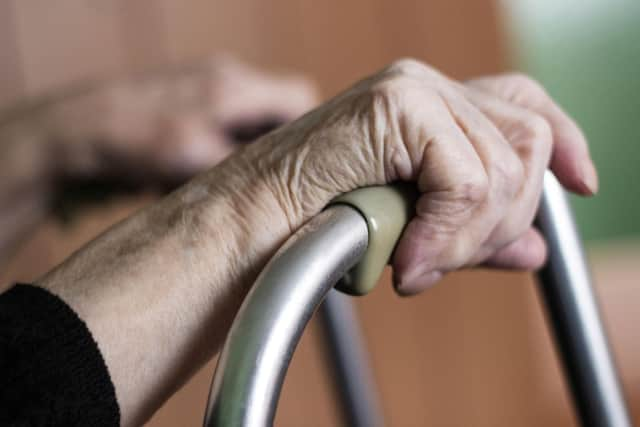Charities warn of hidden crisis in Scottish social care for people with dementia in ‘devastating isolation’
Alzheimer Scotland has led charities urging the Scottish Government to bring in major reforms in the way care services are delivered to stop dementia becoming Scotland’s shame.
National and local organisations said the needs of people with dementia have dramatically increased after prolonged isolation and they now need high levels of formal support – but for many it isn’t available.
Advertisement
Hide AdAdvertisement
Hide AdThe call to tackle an accelerating crisis comes days after a damning report revealed hundreds of vulnerable Scots with conditions such as severe dementia were moved from hospitals to care homes without due consent at the start of the pandemic, amid confusion over the legal rights of adults with incapacity.


Fears over the treatment of people with dementia have also sparked renewed calls for answers over unexplained excess deaths at the start of the pandemic, with a leading charity claiming it could be linked to the lack of support for people living at home.
The Scottish Government recently admitted the pandemic has meant that those suffering with dementia have deteriorated “more quickly than would normally be expected.”
Alzheimer Scotland found more than 40 per cent of those who receive a care and support package had it reduced or stopped since the start of the pandemic.
Jim Pearson, the charity’s director of policy and research, said: “Care of people with dementia has been decimated during Covid. Delivery of social care was already strained before.


“The gaps in support have been exposed in a cruel way. Day care has been closed and home support was reduced or withdrawn, leaving people suffering in devastating isolation.”
In its report on the ‘hidden impact’ of Covid republished for dementia awareness week, Alzheimer Scotland warns care provided by family members that have helped fill the gaps in community services will “sharply decline” as people return to work and furlough comes to an end.
Some 90,000 people live with dementia in Scotland, with most living at home and a third in care homes.
Advertisement
Hide AdAdvertisement
Hide AdFewer than half people diagnosed in 2020 were getting support prior to the pandemic.


Meanwhile, the likelihood of people receiving a timely diagnosis was reduced, along with options for support after the condition has been confirmed.
Mr Pearson said: “If people don’t get support, they are more likely to fall into crisis then end up in hospital or a care home earlier. The gap between aspirations and services is way too high and there’s a pent-up demand, as we’ve seen formal diagnoses being delayed.
“Dementia is taking over as one of the biggest causes of death and disability, yet it’s not a core, national priority.”
The charity said for too long, dementia had been “hidden under a mental health banner”.
It has recommended that all social care and community services are reinstated and that the Scottish Government set up a dedicated fund to double the capacity of Health and Social Care Partnerships (HSCPs) to provide support.
In response to an independent review calling for urgent improvements in adult social care, commissioned in response to the catastrophic impact of Covid on care homes, the Scottish Government has opened a consultation on a national care service.
The plan would see care budgets set nationally and central support for those with specialist needs like dementia. Care home operators would be required to meet national standards.
Advertisement
Hide AdAdvertisement
Hide AdCharities said it could help drive up standards, but stressed the need for improved support and accountability now.
Adam Stachuara, head of policy and communications at Age Scotland, said: “Through our helpline we heard social care packages stopped overnight for people at home. We’re talking about vast numbers of people who are isolated and ill with no real recourse for emergency care.
“With services removed or reduced, care has largely been left to the unpaid carer workforce. Many are now on their knees. That’s a big concern.
“We also know there has been excess deaths of people with dementia at height of pandemic. Are these people who were left at home with no or reduced social care? Many questions still have to be answered on the unacceptable ways people with dementia have been treated.
“We’ve seen the haste to remove people from hospitals and the chilling practice of doing this to people who don’t have capacity to make decisions. It’s clear health boards often make up their own rules.
“We are facing a crisis in social care and more accountability is needed. It doesn’t feel like there’s enough central government action to support social care.
John MacMillan, chief executive of the Eric Liddell Centre in Edinburgh, said: “People are isolated in a way we don’t understand. That has been largely swept under the carpet.
“The challenges of lockdown increased ten-fold for those with dementia. The use of online platforms although positive in part brings with it more challenges as the individuals’ cognitive abilities have been affected by dementia.
Advertisement
Hide AdAdvertisement
Hide Ad“Needs of older people who have a neurological condition such as dementia are significantly different. Our clients and their families have told us they want to see day care and community services reinstated.
“We need to be brave enough to fully integrate health and social care, to get a more workable model and dedicated funding for services for people with dementia, or it will become Scotland’s shame. It’s a ticking time bomb.”
A Scottish Government spokesperson said: “To ensure our social care system consistently delivers high quality services across Scotland, we will establish a national care service in this parliamentary term.
“This service will oversee the delivery of care, improve standards, ensure enhanced pay and conditions for workers. It will provide better support for unpaid carers, and as part of a rights-based approach, we will strengthen residents rights in adult residential settings.
“Currently we are implementing the National Dementia Covid-19 Action Plan with partners, which continues to support recovery for people with dementia and their carers across all care settings.”
A message from the Editor:
Thank you for reading this article. We're more reliant on your support than ever as the shift in consumer habits brought about by coronavirus impacts our advertisers.
If you haven't already, please consider supporting our trusted, fact-checked journalism by taking out a digital subscription.
Comments
Want to join the conversation? Please or to comment on this article.